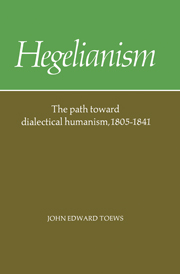Book contents
- Frontmatter
- Contents
- Preface
- Introduction: the Hegelian project in ideological perspective
- PART I PHILOSOPHY AND CULTURAL INTEGRATION: HEGEL IN CONTEXT
- PART II THE HISTORICAL APPROPRIATION OF THE ABSOLUTE: UNITY AND DIVERSITY IN THE HEGELIAN SCHOOL, 1805–1831
- PART III THE REDUCTION OF THE ABSOLUTE TO “MAN”: THE DIVISION OF THE SCHOOL AND THE EMERGENCE OF THE HEGELIAN LEFT, 1830–1841
- EPILOGUE: BEYOND “MAN” – THE RISE AND FALL OF LEFT HEGELIAN HUMANISM
- Notes
- Bibliography
- Index
Introduction: the Hegelian project in ideological perspective
Published online by Cambridge University Press: 08 January 2010
- Frontmatter
- Contents
- Preface
- Introduction: the Hegelian project in ideological perspective
- PART I PHILOSOPHY AND CULTURAL INTEGRATION: HEGEL IN CONTEXT
- PART II THE HISTORICAL APPROPRIATION OF THE ABSOLUTE: UNITY AND DIVERSITY IN THE HEGELIAN SCHOOL, 1805–1831
- PART III THE REDUCTION OF THE ABSOLUTE TO “MAN”: THE DIVISION OF THE SCHOOL AND THE EMERGENCE OF THE HEGELIAN LEFT, 1830–1841
- EPILOGUE: BEYOND “MAN” – THE RISE AND FALL OF LEFT HEGELIAN HUMANISM
- Notes
- Bibliography
- Index
Summary
This study is intended as a contribution to the contemporary understanding and inner appropriation of modern European cultural and intellectual history on two distinct, but intimately connected and overlapping, levels. It can be read, first of all, as a contribution to the early history of Hegelianism, as an attempt at a systematic description and comprehensive, contextual reconstruction of the historical genesis, appropriation, inner division, and first fundamental transformation of what was certainly one of the most significant and influential of the many competing Weltanschauungen, philosophical “faiths,” or cultural ideologies (British philosophic radicalism and French Saint- Simonianism are obvious parallel phenomena) that replaced traditional Christian or Jewish religion in the minds and hearts of many European intellectuals in the first half of the nineteenth century. But the thematic focus of this particular historical reconstruction of Hegelianism – the transition from “the actualization of the absolute” to the “self-actualization of man, ” from the incarnation of the transcendent in the immanent to the self-production of man's immanent essence in concrete historical existence – also connects this study to a more general problem that transcends the specific experiences and perspectives of academic schools and intellectual cliques in pre-1848 Germany and has constituted a major factor in the social and intellectual history of the western world for at least the last three centuries: the protracted, often agonizing, sometimes exhilarating, disintegration of the experienced vitality and viability of religious and metaphysical faith, of belief in the objective reality of a transcendent foundation of personal identity and communal integration.
- Type
- Chapter
- Information
- HegelianismThe Path Toward Dialectical Humanism, 1805–1841, pp. 1 - 10Publisher: Cambridge University PressPrint publication year: 1981



